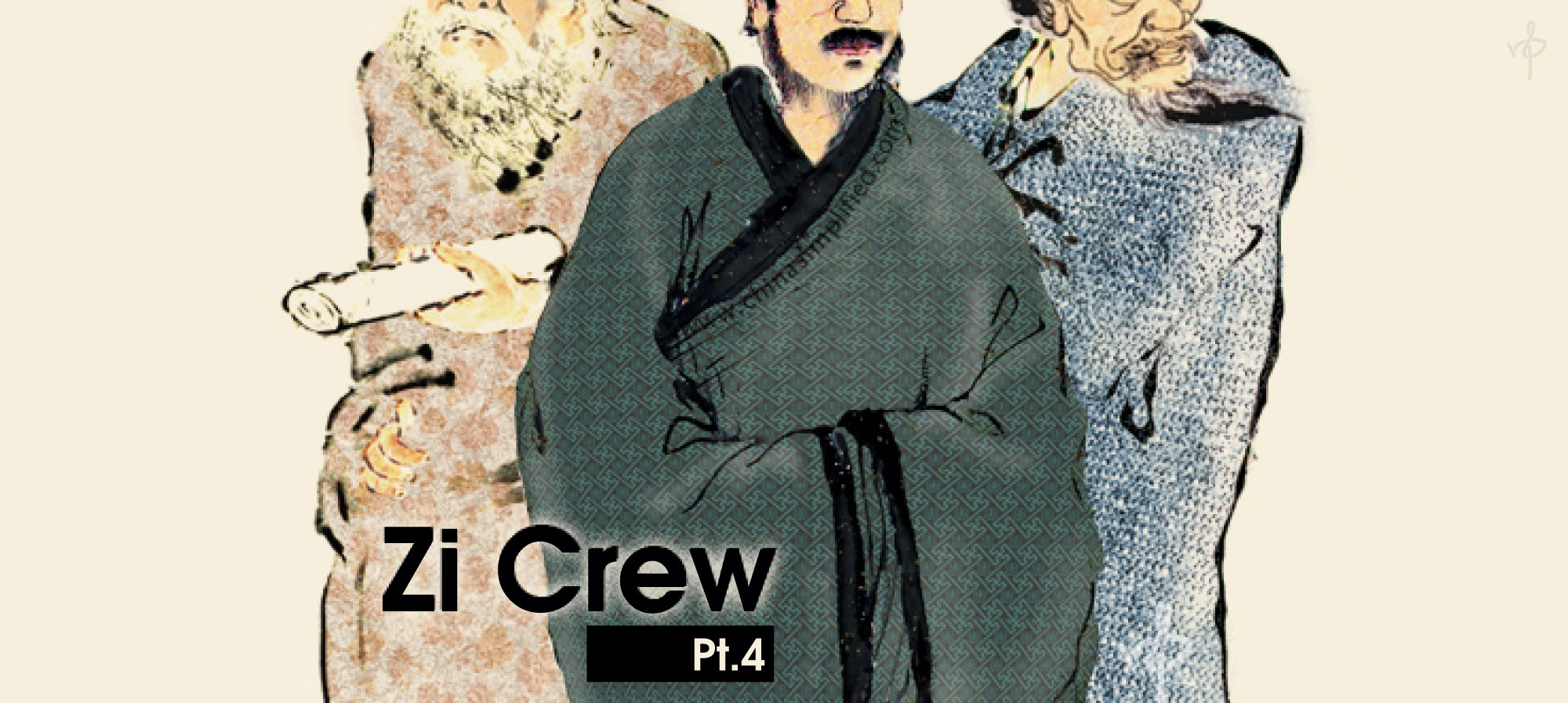Obiwan Kenobi: Use the force, Luke.
Luke Skywalker: Obiwan? You’re coming out of the closet…as a Daoist?
In the final post of this series, we’d like to share our distillations of the Zi Crew’s philosophies as applied to modern life:
Kongzi (aka. Confucius) 551-479BC
Study the wisdom of the past and apply your own judgment, then you can live with integrity.
Favorite quote: “Worry not that no one knows of you; seek to be worth knowing.”
Laozi (aka. Lao-Tzu) 6th century BC
Excessive desires are unnatural, and will lead to a dissatisfying life.
Favorite quote: “When the beautiful strives to be beautiful, it is repulsive. When the good strives to be good, it is no good.”
Mozi 470-391BC
We are benevolent beings inclined to universal love towards all, not just family & friends, and learn through adversity (anti-ritual pacifist).
Favorite quote: “If something benefits the world, then do it; if it does not, then stop doing it.”
Zhuangzi 389-286BC
Trying to figure out life is futile. Perfect happiness is the absence of striving for happiness. (anti-Confucian Daoist)
Favorite quote: “Am I the one who dreamt of the butterfly, or the butterfly dreaming I’m me?”
Mengzi (aka. Mencius) 372-289BC
We are good by nature, but effort is needed to cultivate ourselves and avoid corrupting environments. (orthodox Confucian)
Favorite quote: “If we put profit ahead of righteousness, we won’t be satisfied without grasping from others.”
Xunzi 310-235BC
When you observe goodness in others, inspect yourself in hopes of finding it. When you observe badness in others, examine yourself to eliminate it. (anti-Daoist Confucian)

Zi Crew Overindulgence: A Speculation
Confucius was rumored to once have journeyed to East Zhou to meet Laozi, seeking guidance from the elder philosopher. And while nobody suggests Sunzi was there, we can still entertain the fantasy of a heated, alcohol-soaked confab with the three masters, drawing upon the tenets of their philosophies. Let’s join them now, already multiple jars of huangjiu (yellow rice wine) into the evening:
Confucius:Every day I examine myself on three counts: Have I been responsible? Have I been trustworthy? And have I failed to practice what I teach?
Laozi: I find that when I let go of me, I might become me.
Confucius: A gentleman should be courteous, refined, respectful, restrained―
Sunzi: And follow his ruler to the benefit of the State.
Confucius: Observe closely the kind of mistakes a person makes, and then you shall know his character!
Laozi: To know one does not know is better than to not know one does not know.
Sunzi: Know the enemy as you know yourself, then your victory is assured.
Confucius: People must be guided with virtue, kept in line by means of ritual―
Laozi: Rituals…ugh. (to Sunzi) He’s harping on rituals again.
Sunzi: Waiter, more huangjiu!
They clink and empty their glasses.
Confucius: All I’m saying is leaders should encourage proper conduct, rather than forcing behavior through a complex array of laws –
Laozi: I say, the more laws the more thieves!
Confucius: Then the wise will not be confused, the good will not worry, and the courageous will not fear…even in a world of constant war.
Sunzi: War!!! Finally a topic I’m interested in.
Laozi: A military victory is not a thing of beauty.
Sunzi: Only one who knows the evils of war can understand the profitable way of engaging it.
Laozi: If you talk about destruction, baby you can count me out.
Confucius: Wow…you said that?
Laozi: No…John Lennon.
Sunzi: Waiter, more huangjiu!
They clink and empty their glasses.
Confucius: By the way, how’s the Daodejing selling these days?
Laozi: Not bad. Your Analects?
Confucius: I’m going to fire my agent.
Laozi: Anal-acts? Maybe you need a catchier title.
Sunzi: Art of War yeah! Worldwide bestseller on amazon.com!!
Confucius & Laozi: Waiter, more huangjiu!!!
As Here so Elsewhere
The Confucians, Daoists and Mohists all searched for ways to counteract the suffering of their day, not unlike other philosophers around the planet. Author Karen Armstrong writes, “All the sages preached a spirituality of empathy and compassion; they insisted that people must abandon their egotism and greed, their violence and unkindness… You could not confine your benevolence to your own people: your concern must somehow extend to the entire world.” Armstrong notes that Socrates himself, sounding eerily Daoist, believed he had a mission to make the rational Greeks aware that, even when we are most rigorously logical, some aspect of the truth will always evade us.
The Zi Crew’s impact on East Asian philosophy was no less profound. Their way of thinking became the backbone of the Chinese culture, and is almost certain to remain so far into the future. In the words of mythologist Joseph Campbell, “The world is different today…but the inward life of man is exactly the same.”
For more Zi Crew, check out our earlier posts:
Part One: Kongzi 孔子 (Confucius) Self-Help Guru
Part Two: 3 Things You Might Not Know About Lao-Tzu 老子 (Laozi)
Part Three: Sun Tzu 孙子 (Sunzi) the Master of Winning Smart.









